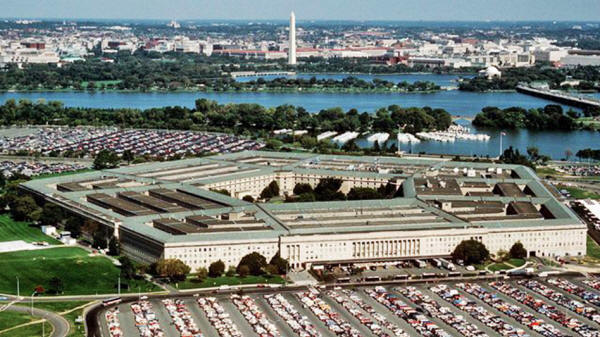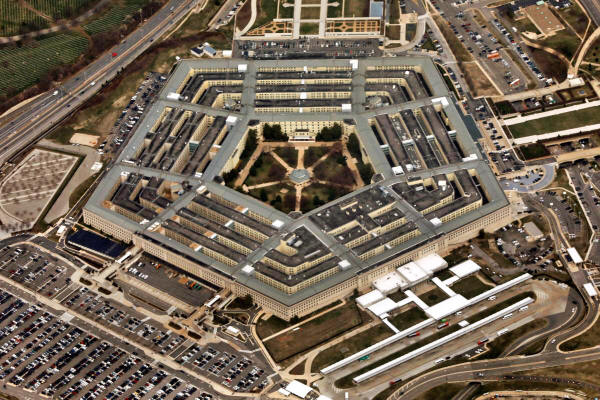|

by Rebecca Kheel
November 14,
2018
from
TheHill Website

Getty Images
The United States is on track to have spent nearly $6 trillion on
war since
the Sept. 11, 2001, 'terrorist' attacks,
according to a report released Wednesday.
The
annual analysis from the Watson
Institute for International and Public Affairs (WIIPA)
at Brown University far exceeds Pentagon estimates because it looks
at all war-related costs - including the Pentagon's war fund,
related spending at the State Department, veterans care and interest
payments - for military operations in Iraq, Syria, Afghanistan and
elsewhere.
"We were told to
expect wars that would be quick, cheap, effective and beneficial
to the U.S. interest," study author Neta Crawford said at a
Capitol Hill news conference.
"Because we finance
these wars on a credit card, the costs of the wars themselves
pose a national security challenge."
The study (Costs
of War through FY2019) estimates that war-related
spending through fiscal 2019 will total $4.9 trillion. Another
projected $1 trillion for veterans care through fiscal 2059 brings
the total to $5.9 trillion, according to the study.
Should the wars continue through fiscal 2023, total costs will be
more than $6.7 trillion, the study added, citing the Pentagon's
projected future years' spending and likely needs for veterans.
"It's important for
the American people to understand the true costs of war, both
the moral and monetary costs," Senate Armed Services Committee
ranking member Sen. Jack Reed (D-R.I.) said in a statement.
"Our nation continues
to finance wars and military operations through borrowing,
rather than asking people to contribute to the national defense
directly, and the result is a serious fiscal drag that we're not
really accounting for or factoring into deliberations about
fiscal policy or military policy."
The latest Pentagon
estimate pegged its costs in Afghanistan, Iraq and Syria since 9/11
at $1.5 trillion, according to its August report to Congress.
The Watson Institute study says the Pentagon and State
Department war funds for Iraq and Afghanistan make up $1.8
trillion of its total alone, with,
-
Iraq costing $822
billion
-
Afghanistan
costing $975 billion
-
Syria has cost
$54 billion
-
Pakistan has cost
$10 billion
-
the post-9/11
homeland security mission known as Operation Noble Eagle has
cost $23 billion
-
other war funds
for Africa and Europe have cost $137 billion,
...the study adds.
In addition to spending, the study (Human
Cost of the Post-9/11 Wars) estimates the total death
toll in Iraq, Afghanistan and Pakistan related to U.S. military
operations since 9/11 at between 480,000 and 507,000.
The number includes,
-
U.S. military
personnel
-
Pentagon
civilians
-
U.S. contractors
-
allied forces
-
civilians
-
opposition forces
-
journalists
-
humanitarian
workers,
...and others.
Pentagon Fails
...its
First-ever Audit - Official Says...
by Idrees
Ali and Mike Stone
November 15,
2018
from
Reuters Website

The Pentagon in Washington, U.S.,
is seen from aboard Air Force One,
March 29, 2018.
REUTERS
Yuri Gripas - RC125AF3E6D0
WASHINGTON
The Pentagon has failed what is being called its first-ever
comprehensive audit, a senior official said on Thursday, finding
U.S. Defense Department accounting discrepancies that could take
years to resolve.
Results of the inspection - conducted by some 1,200 auditors and
examining financial accounting on a wide range of spending including
on weapons systems, military personnel and property - were expected
to be completed later in the day.
"We failed the audit,
but we never expected to pass it," Deputy Secretary of Defense
Patrick Shanahan told reporters, adding that the findings showed
the need for greater discipline in financial matters within the
Pentagon.
"It was an audit on a $2.7 trillion dollar organization, so the
fact that we did the audit is substantial," Shanahan added.
The U.S. defense budget
for the 2018 fiscal year that ended on Sept. 30 was about $700
billion.
The Pentagon is a huge
agency with,
-
multiple branches
of the military
-
costly weapons
systems
-
large personnel
needs
-
numerous military
bases of various sizes at home and abroad
-
troops deployed
in far-flung locales...
Patrick Shanahan
said areas the Pentagon must improve upon based on the audit results
include compliance with cybersecurity policies and improving
inventory accuracy.
In a briefing with
reporters, he did not provide a figure detailing how much money was
unaccounted for in the audit.
It was unclear what consequences there would be after the audit, but
Shanahan said the focus would be on fixing the issues.
"We need to develop
our plans to address the findings and actually put corrective
actions in place," Shanahan said.
"Some of the compliance issues are irritating to me... The point
of the audit is to drive better discipline in our compliance
with our management systems and procedures," Shanahan added.
A 1990 federal law
mandated that U.S. government agencies be audited, but the Pentagon
had not faced a comprehensive audit until this one was launched in
December.
Defense officials and outside experts have said it may be years
before the Pentagon is able to fix its accounting gaps and errors
and pass an audit.
"To clarify, the
audit is not a 'pass-fail' process. We did not receive an
'adverse' finding - the lowest possible category - in any area,"
U.S. Army Lieutenant Colonel Joseph Buccino, a Pentagon
spokesman, said in an email.
"We did receive
findings of 'disclaimer' in multiple areas. Clearly more work
lies ahead of us," Buccino added.
|



